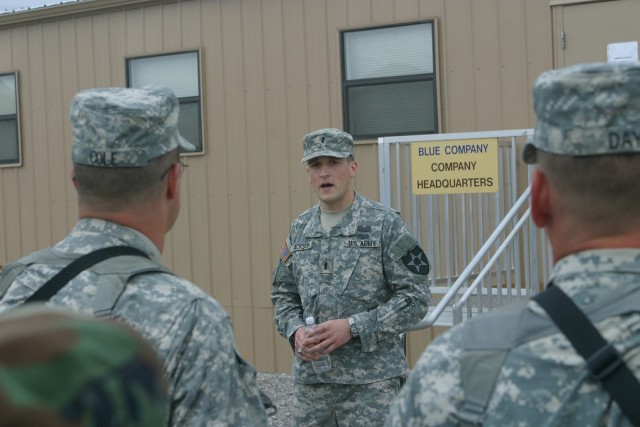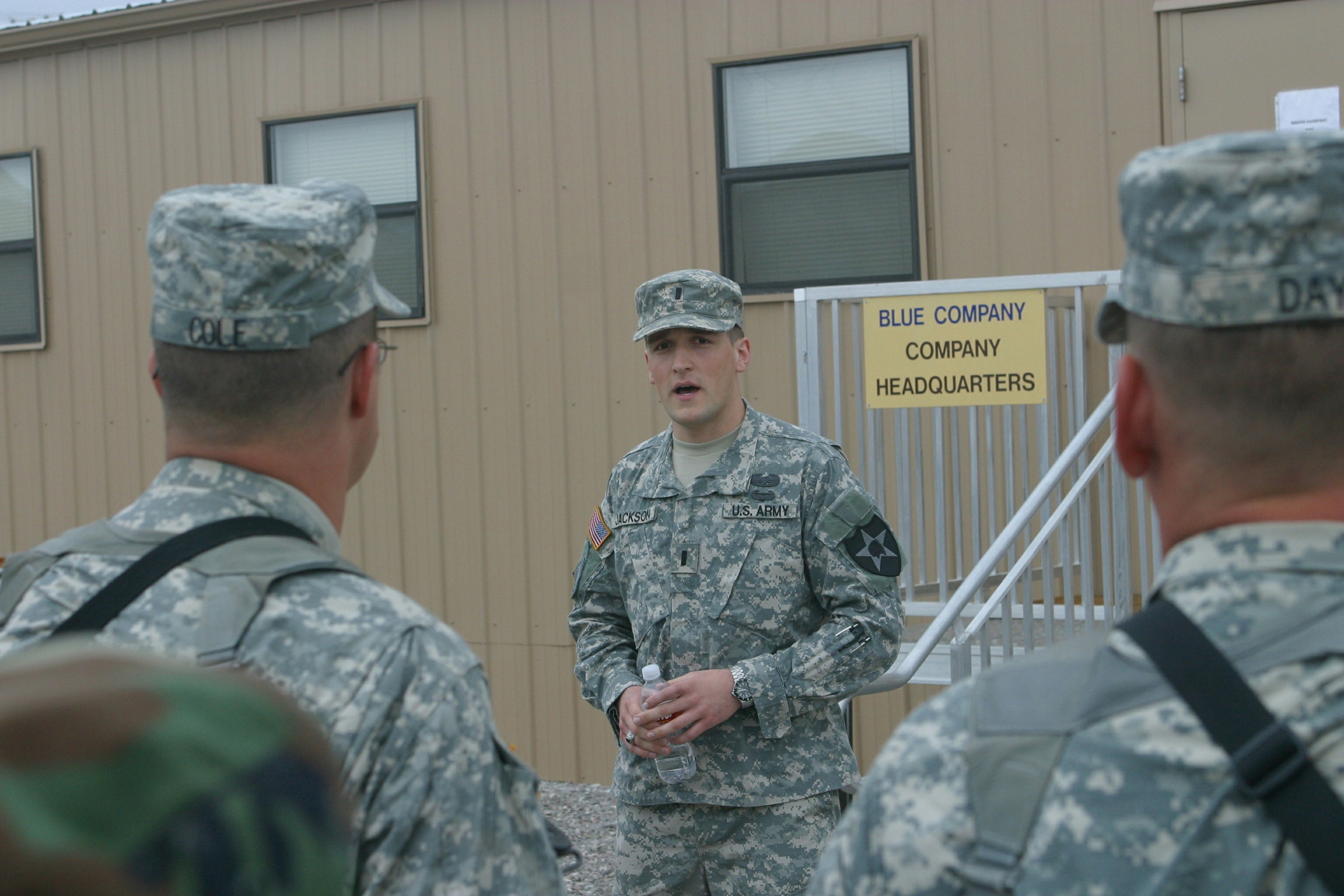FORT SILL, Okla. -- First Lt. Walter Bryan Jackson, the seventh Soldier since the end of the Vietnam War to receive the Distinguished Service Cross, stood in front of some of the cadets of the Basic Officer Leadership Course II and shared his experiences and offered advice to help prepare the students for combat situations.
Jackson deployed to the Al Anbar Province, Iraq, in January 2006 and worked as the fire support officer for A Company Task Force, 1st Battalion, 36th Infantry Regiment. Jackson and other Soldiers were attempting to recover a stuck vehicle Sept. 27, 2006, when they were ambushed. Several of Jackson's Soldiers were wounded, and as Jackson applied first aid, he was shot in the thigh.
Although wounded, Jackson continued to administer first aid to a Soldier while returning fire to the attackers. Jackson was shot again while attempting to move the Soldier to safety. Although his wounds needed immediate attention, he refused medical treatment until the Soldier was treated.
"It is an unnatural thing when in combat to know how to react. I want to say a lot of it is based on your training, but even more so, you fall back on your moral ethical foundation and what is instinctive. A lot of it has to do with common sense <m> you want to help your buddies out because you know if you were in opposite roles you hope they would do the right thing," said Jackson.
He admitted the events during the situation are blurred, but he does remember the feeling of being under attack.
"Every emotion is going through your head at the same time. It takes a lot of focus, I guess, to concentrate on what is more important and suppress all those fears and apprehensive views about doing what is right," he said.
Jackson and the other Soldiers survived the attack, though injured by machine gun fire.
After the attack, Jackson spent about a year recovering at Walter Reed Army Medical Center.
When he found out he was receiving the Distinguished Service Cross, Jackson was shocked. He was preparing to move to Korea and was more concerned about getting to Korea than staying in Washington, D.C., he said.
"(Receiving the award) was humbling and unexpected. I'm just glad the people that I served with that were hurt made it out of there alive and that all four of us survived. It was humbling, and I look at it as a responsibility; I kind of have to give back and make sure I take care of my Soldiers and that I do everything I can to be a good officer," said Jackson.
Although he received such a high honor, Jackson remains humble. The Soldiers in his unit in Korea are unaware of his decorations, he admitted.
Speaking to cadets and young lieutenants at Fort Sill was one of Jackson's first stops on his month-long speaking tour, ending at his alma mater, West Point. He said during his trip, he hopes to teach the cadets how to be good leaders and to try to prepare them as he wished he was prepared, he said.
During Jackson's talks, he emphasized the importance of being a selfless leader.
"Soldiers don't care what you know until they know that you care," he said.
Jackson graduated from West Point in 2005 and said he realizes he is not far removed from the Soldiers in the BOLC classes.
"I don't have more experience, just different. I have a different perspective. Hopefully, the perspective I am giving to cadets and lieutenants is something they can take away and help improve their leadership style. This is something I kind of wish I had when I was in their position, with somebody kind of young to be talking to me about what it was like to be a young officer and something I could apply to make me a better officer," said Jackson.
Capt. Peter Zaffina, a BOLC II platoon mentor, said he recognizes the importance of young officers talking to trainees.
"I think people pay more attention. If your brother is telling you something it's different than your father telling you something," said Zaffina.
After Jackson relayed his story, he answered questions ranging from his experience at Walter Reed to tactical questions from those going to Iraq once they finish their training.
Jackson said he hopes cadets and lieutenants who listen to his speech will remember the value of listening to noncommissioned officers because they have direct interaction with the junior enlisted Soldiers.
"If you can understand and appreciate their perspective, not only does it let them know their voice is being heard, but also you know you are learning from their take on how to interact with certain Soldiers," he advised.
During Jackson's month of speaking he has had to relive the ambush, which is difficult, but he said he hopes his experience can be used as a learning tool.
"It is extra special to try to use (this experience) to make a better, positive impact on the people I interact with, the Soldiers that I work with and civilians that don't know much about the military and get a positive image about what Soldiers do out there day in and day out but also to highlight what a lot of people I served with do on a daily basis. I saw a lot of acts of heroism and valor when I was in Iraq, and a lot of it you never hear about. It's important to get the message out that Soldiers are selfless day in and day out, and people should really appreciate the sacrifice Soldiers make, and I'm speaking not for myself, but for everyone else that I've been with that doesn't get that recognition," said Jackson.
In addition to the Distinguished Service Cross, Jackson was also awarded a Purple Heart, an Army Commendation Medal and an Army Achievement Medal.


Social Sharing